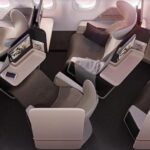 According to a report by our friends at Aviation Week, boosting passenger confidence and creating a sense of well-being aboard the aircraft are priorities of cabin interior specialists as the industry slowly recovers from the pandemic crisis.
According to a report by our friends at Aviation Week, boosting passenger confidence and creating a sense of well-being aboard the aircraft are priorities of cabin interior specialists as the industry slowly recovers from the pandemic crisis.
Pictured: Factorydesign’s seat configuration offers direct aisle access for all business- class passengers on long-haul narrow bodies. Credit: Factorydesign
Along with premium products that offer more physical distance, as well as the use of antimicrobial solutions across the cabin, designers haven’t forgotten the importance of branding and bringing local culture and ambiance into the aircraft cabin.
Acumen Design Associates senior designer Daniel Clucas told Aviation Week the strongest brands will continue to invest in design, even in difficult times, but that “the pressure is on us all to think even more creatively with tighter and limited budgets.”
That’s what Acumen did when the company recently redesigned JetBlue Airways’ Mint premium product, which originally launched in 2014. With the new product, every seat is a suite.
New York-based JetBlue is the launch customer for Thompson Aero Seating’s VantageSOLO seat, a single-aisle seating solution with a herringbone configuration. The materials—from Tapis Corp. and its partner Ultrafabrics—have been updated using Tapisuede Flannel and Ultraleather Promessa AV, which includes an inherent EPA-registered antimicrobial solution for added protection against the growth of bacteria and surface pathogens.
The new Mint premium configuration (24 seats total, including 22 suites and two Mint Studios in the first row) will launch on JetBlue’s A321LR aircraft, which will fly to London in the 2021 third quarter. A smaller 16-seat layout (14 Mint Suites and two Mint Studios) will be previewed on its newest A321neo aircraft that will fly limited service between New York JFK and Los Angeles International Airport this year.
London-based Factorydesign has rolled out a new wedge-shaped approach to business-class seat layout that allows passengers to easily access the aisle in narrowbody long-haul aircraft.
Factorydesign said this new seat configuration “allows both window and aisle seats to share the back of the forward window seat’s shell, while a purposeful corridor between the seat pairs allows for a rearward exit for the window passenger.”
At a pitch of 47 inches, the seat offers a configuration that allows for 40 passengers between doors 1 and 2 of an Airbus A321LR.
Jamco America has launched its newest Venture Pristine clean solution for the aircraft interior, with Venture Pristine Jamco’s latest option for its Venture business-class seat for commercial aircraft, which incorporates the latest antimicrobial and antiviral material finish solutions.
According to Jamco, every aspect of the Venture Pristine trim and finish option helps to maximize cleanliness during flight while allowing more effective sanitizing after use.
Nigerian carrier Air Peace, which will receive its first three of 13 Embraer E195-E2s this year, will configure the premium cabins with Embraer’s staggered seat option, with each of the 12 business-class seats slightly offset from the other to give more space and privacy and three rows of seats arranged two-by-two at 51-inch pitch. Passengers by the windows have unobstructed access to the aisle.
HAECO Cabin Solutions has seen more interest in its previously introduced Eclipse Premium Seat, which encourages social distancing in twin-aisle premium economy and single-aisle, first-class configurations. HAECO said the staggered layout offers “unmatched privacy, comfort and distancing between passengers.”
Airlines and designers still have a vision for moving forward, and they continue to work on branding that encapsulates a carrier’s values and reflects local culture, with the ambiance it brings into the cabin also conveys relaxation and well-being.
In Europe, UK-based design consultancy Tangerine’s recent work on aircraft interiors has included the creation of a cabin for Japan Airlines’ (JAL) new flagship Airbus A350s.

Pictured: UK-based design consultancy Tangerine created the cabin for Japan Airlines’ new flagship Airbus A350s.
Credit: Tangerine
“JAL’s ambitions were to grow their business and create a lasting impression on both their domestic and international passengers,” Tangerine director Melinda Derbyshire said.
The design challenge was how to create an onboard experience that catered both to the specific tastes of the domestic Japanese market while also appealing to the international passengers that JAL is hoping to attract.
“We created a design strategy, ‘Infused Essence,’ that captures the essence of Japanese culture and identity and embodies it in a contemporary travel experience aimed at Japanese and international passengers,” chief creative officer Matt Round explained.
For example, at the front of the cabin, the bulkhead wall has a pleated architectural form inspired by origami, which diffuses the cabin’s feature lighting and, rather than trying to make the most of the notoriously tight dimensions of an aircraft’s toilets by adopting the usual light color tones, Tangerine adopted the Japanese tactic of using dark colors and textures to create a sophisticated feel to small interior spaces.
Another UK aircraft design specialist, PriestmanGoode, has designed all-new cabin interiors for Greek carrier Aegean Airlines’ new fleet of Airbus A320neos.
In a nod to the airline’s Greek cultural and architectural heritage, its recognized and popular gull insignia was modernized and incorporated into the new brand identity.
The gull motif was incorporated into subtle patterns on cabin textiles and on the front and rear of the cabin. A stitch pattern in both business and economy cabins reflects the symmetry of classical Greek architecture and what the consultancy describes as the duality between the sky and Aegean Sea. Carpets and cabin décor foils feature abstract patterns inspired by the country’s landscape, while brand panels feature a 3D representation of the twin gull logo.
An edited report from Aviation Week by John Alwyn-Jones



















